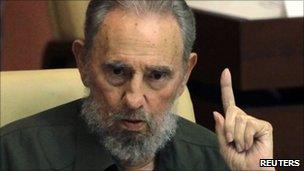What's behind Castro's speech?
- Published

Fidel Castro spoke for 10 minutes but answered questions for an hour
Cuba's former President, Fidel Castro, has continued his return to the public eye with a speech to the country's parliament. The ┤¾¤¾┤½├¢'s Michael Voss was there to analyse what the "Comandante" said.
At the stroke of eleven a hush descended over the National Assembly chambers.
More than 600 deputies all appeared to be holding their breath in anticipation of Fidel Castro stepping back out onto the political stage.
Then they sprang to their feet and cheered. "Viva Fidel! Viva Fidel!", they chanted. "Long live Fidel."
The last time that Cuba's former leader addressed the assembly was in June 2006, just a month before he underwent major surgery and ceded the presidency to his younger brother, Raul Castro.
After a long period of convalescence and seclusion, Mr Castro re-emerged last month.
Since then he has given television interviews, launched his memoirs, seen a dolphin show at the National Aquarium and talked to selected groups of intellectuals and young communists.
But this was his first government act.
Nuclear warning
Fidel Castro, who turns 84 next week, walked slowly but steadily towards the podium with an assistant at his side to support him.
The man who led the Cuban revolution and ruled this island for almost half a century was once again wearing his trademark olive green fatigues, but without any military insignia.
Fidel Castro outlined the ''immensely higher price'' of a war
This was not the full dress uniform of the "Comandante", the Commander-in-Chief.
He smiled and waved to the crowd as he lapped up the warmth of their applause, before launching into his speech.
Fidel had asked for this special session of the assembly so that he could discuss his repeated warnings that the United States, along with Israel, has plans to attack Iran and target North Korea.
It is a theme that has preoccupied him for several months; he has issued regular warnings that the world is about to be dragged into a nuclear war.
"They would be ordering the instant death of hundreds of millions of people and amongst them an incalculable number of their own people."
But instead of a vitriolic attack on his arch nemesis, the Unites States, Fidel appealed to President Barack Obama, saying that it was within his power to avert disaster.
The whole speech lasted just over 10 minutes and then, seated, he fielded questions for another hour. In his prime the bearded revolutionary had been famous for four- and five-hour tirades.
It was a short but polished performance from the lively and healthy-looking Fidel Castro, his voice stronger and more assured than at any point since re-emerging into the public eye.
At no point did he touch on domestic issues.
There was no mention of the island's struggling economy, which is the major preoccupation for the majority of Cubans these days.
He did not comment on any of his brother's policy changes, such as allowing workers to be self-employed instead of being controlled by the state or the decision to release political prisoners.
President Raul Castro was on the podium listening to the speech, the first time the two have appeared in public together since 2006. Yet the two barely acknowledged each other's presence.
At every assembly session for the past four years Fidel's desk has remained unoccupied, as if waiting, symbolically, for the return of the "Maximum Leader". Raul sits at the same place he has always had, one chair in from the head of the table.
Yet Fidel Castro did not return to his old seat, preferring to sit at the next table, beside the parliamentary head, Ricardo Alarcon.
No stripes
For weeks now Havana has been rife with speculation about why this series of appearances has taken place, after a long period in seclusion.
After his speech, Fidel Castro did not return to his old seat next to his brother Raul
Ask four foreign diplomats here and you are likely to get five conflicting answers.
Is this a bid to return to power or is it simply that he is well enough to be back in the limelight once again?
By making no mention of domestic politics is he deliberately trying not to undermine his brother's authority or is his presence giving weight to hard-liners who are opposed to the changes currently underway?
Before the speech I asked the minister of culture and politburo member, Abel Prieto, how he saw Fidel Castro's return to politics.
"I think that he has always been in Cuba's political life," he told me.
"But he is absolutely not interfering in government matters. He has been very careful about that. His big battle is international affairs."
Another deputy, the internationally-acclaimed pianist Frank Fernandez agreed.
"He has absolute confidence in Raul. He is only talking about international affairs," Mr Fernandez said, adding that he thought the plain military fatigues were significant.
"There are a series of signs. He's not wearing the Comandante's stripes on his uniform. This suggests that he doesn't want any involvement in the organised politics."
Fidel Castro may have given up the presidency but he remains head of the powerful Communist Party.
Now it seems he may have found a new mission in later life - to save the world from nuclear destruction.
- Published28 July 2010
- Published13 July 2010